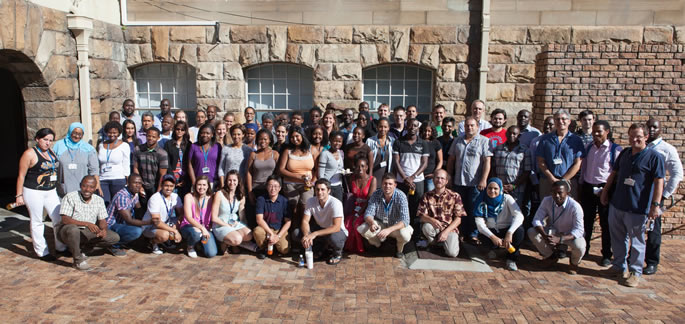Vision
Driving science to promote world health’ with an emphasis on cutting-edge research, training students and staff, mentoring and enhancing research capacity in South Africa.
Mission
To use an integrated cohesive immunology programme of research, education and service to combat communicable and non-communicable diseases in South Africa and beyond.
Driving science to promote world health
The Division of Immunology is housed within the Department of Pathology in the Faculty of Health Sciences of the University of Cape Town. It was formerly known as the Department of Clinical Science and Immunology, and has formed an active part of laboratory-based immunology research and diagnostics since the early 1970s. Today, the Division of Immunology is world-recognised and is involved in a range of activities, from basic and applied research, with a focus on identifying immune mechanisms to various communicable and non-communicable diseases, to under- and post-graduate teaching, and to diagnostic testing and histocompatibility services.
A particular strength and ongoing goal of the division is to forge and maintain strong links between basic and clinical immunology, so that a bidirectional and translational approach – from mouse to human and human back to mouse – can provide us with a unique angle for understanding disease and pathologies in Africa.
Our vision is ‘driving science to promote world health’ with an emphasis on cutting-edge research, training students and staff, mentoring and enhancing research capacity in South Africa.
Most of the staff of the Division are also active members of the Institute of Infectious Diseases and Molecular Medicine ( IDM )
Research
UCT has a strong track record in immunology and aims to become the centre of immunology research in Africa. Students come from all over Africa and, indeed, the world and most of the research projects are internationally collaborative which is essential for meaningful research. There is a great deal of fluidity – with staff regularly going for training in partner laboratories and overseas scientists visiting the division.
The division primarily looks at the host-immune response against pathogens including HIV, fungi, mycobacteria, protozoa and helminths. The unifying theme to the various research groups is to understand immune function in different disease states that can inform clinical and therapeutic strategies, which can then be applied to clinical settings.
The range of research specialty in the division includes diseases particularly relevant to Africa namely HIV/AIDS, Tuberculosis, Leishmaniasis, Lysteria and Helminths. These infections cause high morbidity and mortality in humans.
To understand basic mechanisms, the use of genetically engineered transgenic mouse models can uncover and investigate the genes, factors and cells beneficial or detrimental to disease outcome. This approach supports the long-term goal of safe and cost-effective drug and vaccination strategies.
Service
Within the NHLS, the Laboratory for Tissue Immunology is responsible for HLA class I and class II typing for solid organ and bone marrow/stem cell matching. It is the only HLA lab in South Africa to have European Federation of Immunogenetics (EFI) accreditation. The Laboratory also performs cross-matching and pre-formed antibody testing for renal transplantation. The Allergy and Clinical Immunology Laboratory performs routine diagnostic testing for autoantibodies and different allergies.
Teaching
The Division has an active teaching component in the medical undergraduate syllabus. Immunology concepts and principals are imparted through case studies and the problem based learning approach by the Faculty. More advanced course are offered at the post-graduate level through the Honours in Infectious Disease and Immunology programme and Advanced Immunology.

